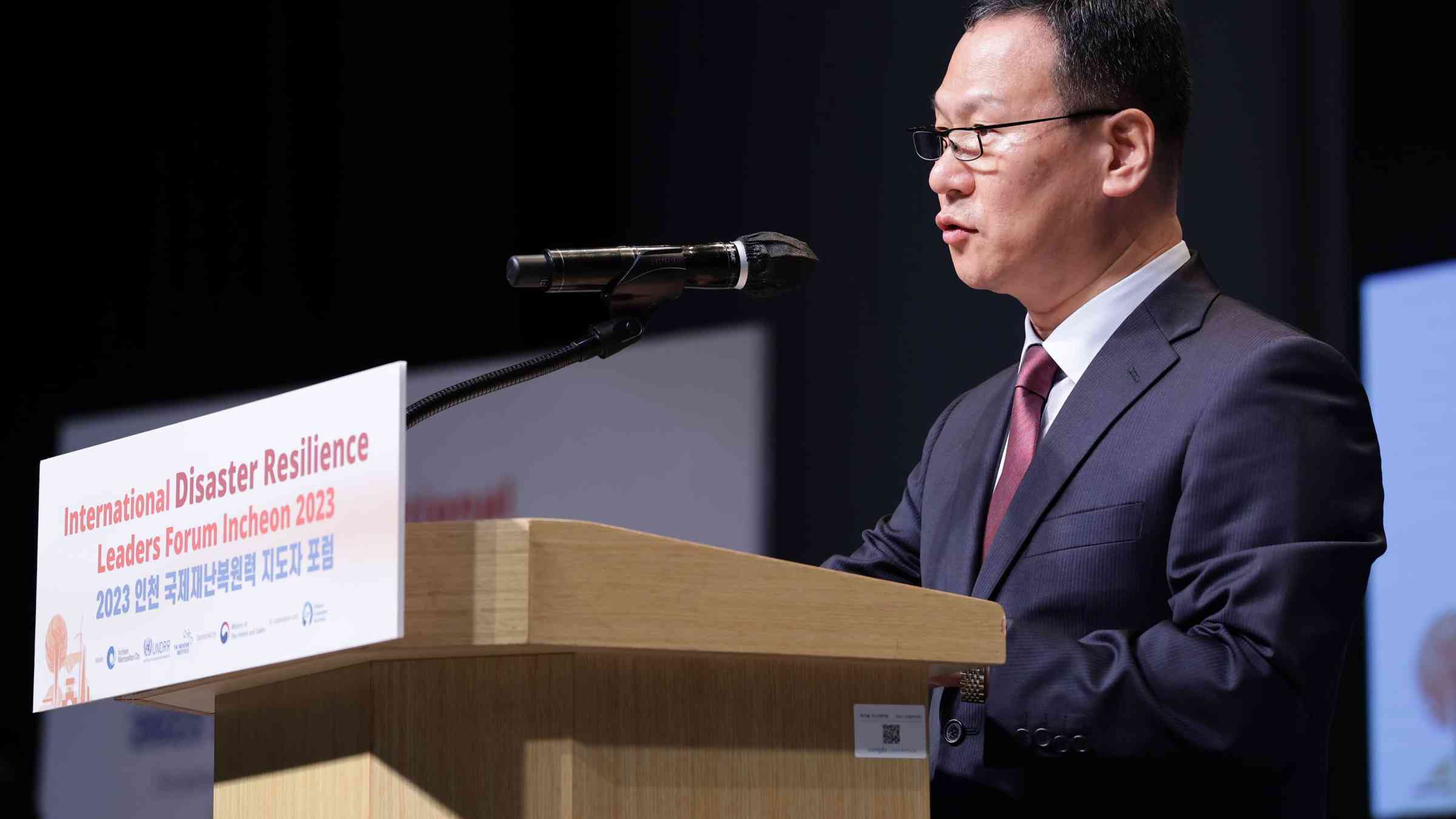
A combination of innovative ideas and unity is the key to unlock a transformational response to escalating climate and disaster risk.
An all-of-society approach that embraces the capacity, experience, and expertise of all sectors and communities will accelerate efforts to strengthen the resilience of cities and citizens around the world.
The Vice Mayor of Incheon, Republic of Korea, Mr Deok-soo Park issued his call for action as he opened the 2023 International Disaster Resilience Leaders Forum Incheon under the theme ‘Enabling technological application and partnership for climate and disaster risk reduction’.
‘As the saying goes, crisis presents opportunity and one single country’s effort is never enough,’ said Vice Mayor Park. ‘It is imperative for citizens, academia, and businesses to participate, along with the close cooperation among cities across the world.
‘Incheon is committed to playing a role as a global leader and will work together with more cities and countries to accelerate implementation of the Sendai Framework for Disaster Risk Reduction and the Paris Agreement on Climate Change.’
The Forum has brought together 140 national and local government representatives from 25 countries and 31 cities. Twenty-four of these local governments have committed to reduce their disaster risk reduction as part of the Making Cities Resilient 2030 (MCR2030) global partnership.
The Special Representative of the United Nations Secretary General for Disaster Risk Reduction, Ms Mami Mizutori, said the Political Declaration of the Midterm Review of the Sendai Framework – adopted recently by the Member States of the United Nations General Assembly – highlighted the instrumental role of science and technology to prevent and reduce disaster risk.
‘When harnessed and applied effectively, such innovation strengthens the understanding and governance of disaster risk,’ Ms Mizutori said. “It enhances the ability to better protect communities, including through the scaling up of multi-hazard forecasting and early warning systems. This is why the theme of this year’s Forum is critically important.’
Mr Yong-kyun Kim, Director General of Disaster Management Policy Bureau, Ministry of the Interior and Safety of the Republic of Korea, said local leadership was critical to reducing disaster risk. He recalled how this was a major theme of the 2010 Asian Ministerial Conference on Disaster Risk Reduction hosted by Incheon 13 years ago.
Mr Hokoon Park, President of the Incheon Institute, called for continued efforts to strengthen coordination between national and local levels to address disaster risk that is increasingly interlinked and urban based.
The Secretary-General of the Trilateral Cooperation Secretariat, Mr Hee-sup Lee, highlighted the role of regional cooperation in leveraging science and technology. He outlined how disaster risk reduction remains at the forefront of cooperation efforts between China, Japan, and Republic of Korea.
In his remarks, the Secretary General of ASEAN H.E. Dr Kao Kim Hourn emphasized the importance of applying technology and developing partnership to make a difference on the ground in terms or strengthened resilience and reduced inequalities. He said fostering an enabling environment is a priority for ASEAN in an era of a rapidly changing disaster risk landscape.
MCR2030 is a United Nations-led global partnership that has mobilized 30 national governments, 10 national municipality associations, and more than 1,580 local governments, committed to strengthening local disaster and climate resilience. Twenty-five of these cities have been recognized as MCR2030 Resilience Hubs – global leaders in various disaster and climate-related resilience actions, such as heatwave management, floods risk reduction, investment in green infrastructure, among other areas. The Hubs include Incheon, the host city of the conference.
The 2nd International Disaster Resilience Leaders Forum Incheon 2023 was hosted by Incheon Metropolitan City. It was co-organized with the Incheon Institute, Ministry of Interior and Safety of the Republic of Korea, Trilateral Cooperation Secretariat, and the United Nations Office for Disaster Risk Reduction.
The conference is sharing experience and good practice on disaster resilience as part of wider efforts to scale up implementation as we enter the second half of the overall Agenda 2030 for Sustainable Development.

